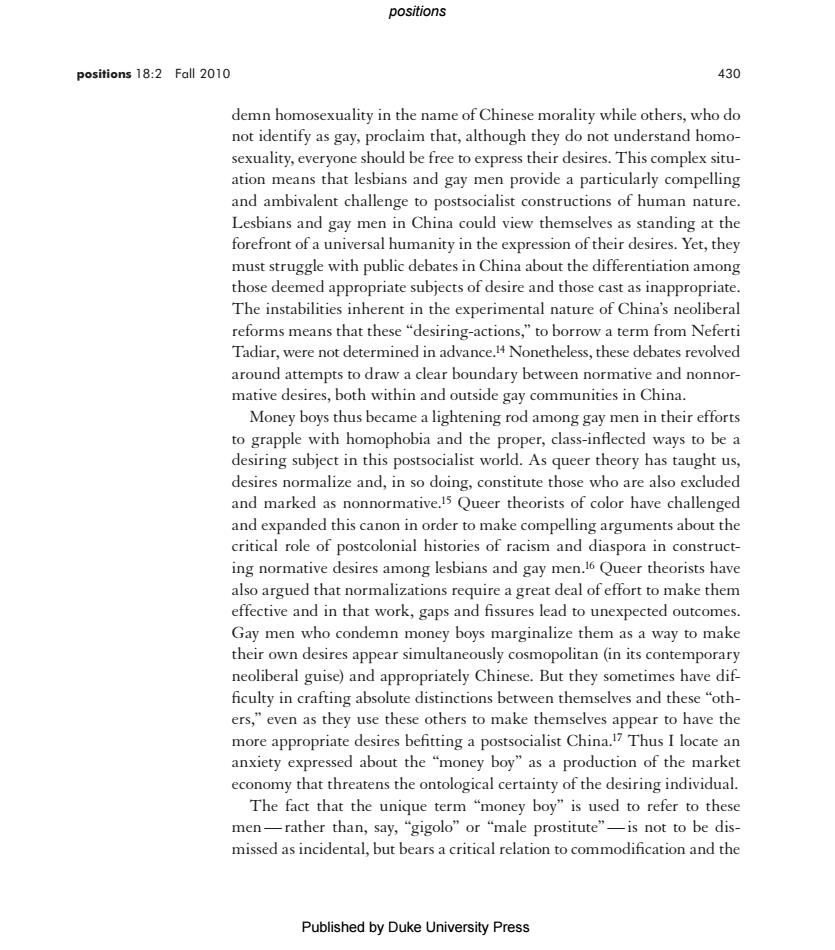正在加载图片...

positions positions 18:2 Fall 2010 430 demn homosexuality in the name of Chinese morality while others,who do not identify as gay,proclaim that,although they do not understand homo- sexuality,everyone should be free to express their desires.This complex situ- ation means that lesbians and gay men provide a particularly compelling and ambivalent challenge to postsocialist constructions of human nature. Lesbians and gay men in China could view themselves as standing at the forefront of a universal humanity in the expression of their desires.Yet,they must struggle with public debates in China about the differentiation among those deemed appropriate subjects of desire and those cast as inappropriate. The instabilities inherent in the experimental nature of China's neoliberal reforms means that these"desiring-actions,"to borrow a term from Neferti Tadiar,were not determined in advance.+Nonetheless,these debates revolved around attempts to draw a clear boundary between normative and nonnor- mative desires,both within and outside gay communities in China. Money boys thus became a lightening rod among gay men in their efforts to grapple with homophobia and the proper,class-inflected ways to be a desiring subject in this postsocialist world.As queer theory has taught us, desires normalize and,in so doing,constitute those who are also excluded and marked as nonnormative.15 Queer theorists of color have challenged and expanded this canon in order to make compelling arguments about the critical role of postcolonial histories of racism and diaspora in construct- ing normative desires among lesbians and gay men.16 Queer theorists have also argued that normalizations require a great deal of effort to make them effective and in that work,gaps and fissures lead to unexpected outcomes. Gay men who condemn money boys marginalize them as a way to make their own desires appear simultaneously cosmopolitan (in its contemporary neoliberal guise)and appropriately Chinese.But they sometimes have dif ficulty in crafting absolute distinctions between themselves and these"oth- ers,"even as they use these others to make themselves appear to have the more appropriate desires befitting a postsocialist China.7 Thus I locate an anxiety expressed about the "money boy"as a production of the market economy that threatens the ontological certainty of the desiring individual. The fact that the unique term "money boy"is used to refer to these men--rather than,say,“gigolo”or“male prostitute”--is not to be dis- missed as incidental,but bears a critical relation to commodification and the Published by Duke University Presspositions 18:2 Fall 2010 430 demn homosexuality in the name of Chinese morality while others, who do not identify as gay, proclaim that, although they do not understand homosexuality, everyone should be free to express their desires. This complex situation means that lesbians and gay men provide a particularly compelling and ambivalent challenge to postsocialist constructions of human nature. Lesbians and gay men in China could view themselves as standing at the forefront of a universal humanity in the expression of their desires. Yet, they must struggle with public debates in China about the differentiation among those deemed appropriate subjects of desire and those cast as inappropriate. The instabilities inherent in the experimental nature of China’s neoliberal reforms means that these “desiring-actions,” to borrow a term from Neferti Tadiar, were not determined in advance.14 Nonetheless, these debates revolved around attempts to draw a clear boundary between normative and nonnormative desires, both within and outside gay communities in China. Money boys thus became a lightening rod among gay men in their efforts to grapple with homophobia and the proper, class-inflected ways to be a desiring subject in this postsocialist world. As queer theory has taught us, desires normalize and, in so doing, constitute those who are also excluded and marked as nonnormative.15 Queer theorists of color have challenged and expanded this canon in order to make compelling arguments about the critical role of postcolonial histories of racism and diaspora in constructing normative desires among lesbians and gay men.16 Queer theorists have also argued that normalizations require a great deal of effort to make them effective and in that work, gaps and fissures lead to unexpected outcomes. Gay men who condemn money boys marginalize them as a way to make their own desires appear simultaneously cosmopolitan (in its contemporary neoliberal guise) and appropriately Chinese. But they sometimes have difficulty in crafting absolute distinctions between themselves and these “others,” even as they use these others to make themselves appear to have the more appropriate desires befitting a postsocialist China.17 Thus I locate an anxiety expressed about the “money boy” as a production of the market economy that threatens the ontological certainty of the desiring individual. The fact that the unique term “money boy” is used to refer to these men— rather than, say, “gigolo” or “male prostitute”— is not to be dismissed as incidental, but bears a critical relation to commodification and the positions Published by Duke University Press